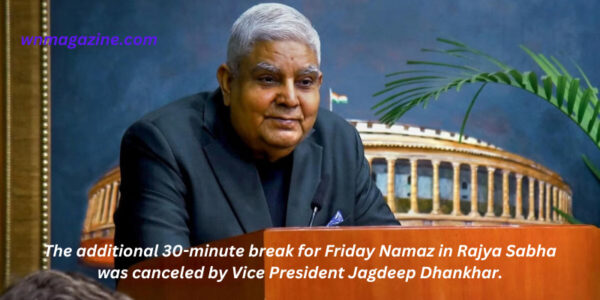On December 8, Jagdeep Dhankar, the Chairman of the Rajya Sabha and Vice President, announced to the house that the Friday session hours would be adjusted to align with the Lok Sabha schedule. During the session at 2:00 PM on Friday, December 8, in response to a query from DMK MP Tiruchi N.
Siva about a specific matter, the Vice President addressed concerns raised regarding the extension of Friday lunch breaks for Muslim members to perform Namaz, in accordance with the Rules of Procedure and Conduct of Business of the Rajya Sabha.
Expressing unease, MP Tiruchi N. Siva pointed out that Muslim members were granted a thirty-minute extension for Namaz during the Friday lunch break, as per the rules. The Rajya Sabha normally meets from 11 a.m. to 1 p.m. and then from 2 p.m. to 6 p.m., with a one-hour lunch break between 1 p.m. and 2 p.m. However, on Fridays, the house convenes after lunch at 2:30 p.m., presumably to accommodate Namaz.
During the zero hour, as the house convened for business on Friday, DMK MP Tiruchi N. Siva raised the issue as a point of order. Contrary to his statement, Chairman Jagdeep Dhankar clarified that the practice of the “Namaz” break had been in place for some time and was not a recent development. He announced that the practice would be discontinued henceforth, citing his earlier decision to align the Friday schedule with the Lok Sabha’s.
Also read : wellhealthorganic vitamin b12
Interestingly, it was noted that only the Rajya Sabha observed the Friday “Namaz” break, while the Lok Sabha typically convenes at 2 p.m. The Chairman explained that both the National Rajya Sabha and Lok Sabha should ideally convene simultaneously, as they are integral parts of Parliament. He emphasized that the adjustment to the Friday schedule was not a new initiative.
Following this clarification, DMK MP M. Mohamed Abdulla expressed disagreement with the decision, asserting that the practice had been standard for 60–70 years, with Friday Jumma for Muslim members scheduled for 2:30 PM.
In response, Vice President Dhankar argued against making special exceptions for Muslim lawmakers, emphasizing that Parliament comprises representatives from all communities. He reminded the members that Lok Sabha representatives are drawn from various sectors and that he had deliberately adjusted the schedule to align with Lok Sabha practices, a decision communicated and implemented in the previous session.
